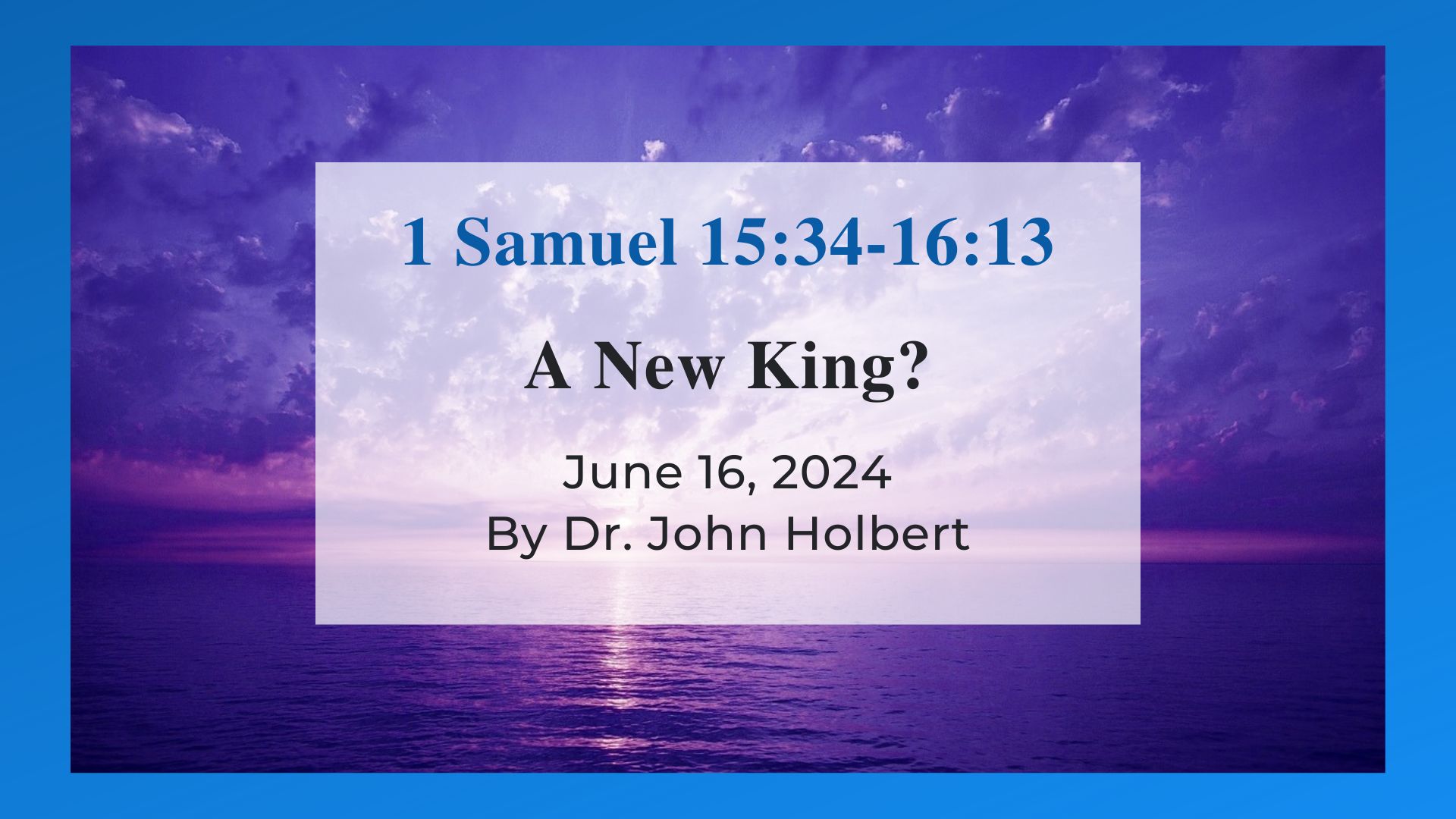A New King? - Reflections on 1 Samuel 15:34-16:13
by Dr. John Holbert on Monday, June 10, 2024

A New King?
1 Samuel 15:34-16:13
The Peripatetic Hebrew Bible Preacher
The story about the astonishing choice of David—the 8th son of 8 sons of the shepherd, Jesse—is rightly focused on here, since David will become Israel’s undisputed greatest king, despite his wanton and cruel behaviors later in his life. The fact that when Jesus rides into Jerusalem on that famous donkey more than 1000 years later to a loud cry from those who witnessed it, “Hosanna to the son of David,” is all the proof we need to cement the name of the second king of Israel in the minds of all Israel. Yet, his choice as king by the aged prophet, Samuel, while the mighty Saul is still very much alive, calls into the most serious question just why Samuel has found his way to the farm of the essentially unknown Jesse. To answer that question forces us to look back at chapter 15 for a fuller context.
In 1 Samuel 15:1-3 Samuel in a towering rage at the ancient actions of the Amalekites against Israel (see Deut. 25:18), commands Saul to “put them to the ban” (cherem), obliterating all “men, women, infants, sucklings, camel and donkey.” And Saul proceeds to do precisely that, wiping Amalek from the face of the earth, but at the same time choosing not to execute the ban in the field, but instead to spare some unspotted creatures worthy of sacrifice along with the king of Amalek, Agag, in order to effect a grand sacrificial holocaust at the holy hill of Gilgal. There is exactly no indication in the call for cherem that it must be done completely in the field of battle. However, when Saul brings his selected sacrificial creatures to the site, Samuel, is having none of it. “And what is the sound of sheep in my ears, and the sound of cattle that I hear?” (1 Sam.15:14). Saul replies calmly that he intends all of the creatures for sacrifice, announcing clearly that he thinks he has in fact performed cherem as commanded.
Samuel angrily disagrees. He repeats his command for cherem, but he adds something quite significant to what he said to Saul earlier. “YHWH sent you on a mission and said to you, ‘You shall put under the ban the offenders, Amalek, and do battle against them until you destroy them all” (1 Sam. 15:19). But that was plainly not the command Samuel gave to Saul at the beginning of the tale. There was nothing said of “battle until you destroy them.” Samuel has construed the call of cherem in his own particular way, a way that captures Saul in a prophetic net of the prophet’s clever devising. What we learned last week of Samuel, that he may be as interested in his own desires as he may be in YHWH’s (1 Sam.8), turns up here again. Given Samuel’s interpretation of cherem, it is obvious that Saul has not completed the ban as Samuel says he demanded. In short, Saul has failed (as he also did when it came to waiting for Samuel to offer sacrifice in 1 Sam.13, though Saul did wait until “the time appointed by Samuel” [1 Sam.13:8]), and Samuel than feels completely justified in deposing Israel’s first king from his throne. He will conclude his attack against Saul with a most confusing phrase in 1 Sam.15:29: “Israel’s Eternal One does not deceive nor repent (change the mind), for YHWH is no human to repent!” Yet, we have already been told that God “repented” (changed the divine mind) that he made Saul king (1 Sam.15:10). Samuel thus says that God will not change the divine mind about changing the divine mind! Once again, such a verbal contradiction casts doubt on Samuel’s reliability as a source for what God may or may not want.
Nevertheless, Samuel is soon borne off to Jesse’s farm where he pours his holy oil on the head of the boy, David, in the presence of his astonished brothers and his father. But even here in this scene of anointing, our narrator plants a seed of surprise in the choice of David. Samuel first looks at Jesse’s eldest son, Eliab, tall and strapping, every inch a prospective king, but he is warned by YHWH, “Look not to his appearance, and to his lofty stature, for I have cast him aside. God does not see as mortals see; for mortals look with the eyes while YHWH looks with the heart” (1 Sam.16:7). Most translations read, “YHWH looks on the heart,” though with the flexibility of Hebrew pronouns either reading may be possible.
But the theological idea that God looks differently than humans do is soon made all too confusing when David appears at the hill of sacrifice. The narrator spends time describing the boy to us: “He was ruddy, with fine eyes, and goodly to look at” (1 Sam.16:12). God may see differently, but we do not; David is a fabulously handsome man/boy, and his great beauty will get him in no end of trouble as the story will unfold. God may see the heart, but we are enamored with the flesh that encloses that heart. But how are we to judge that “heart” of David, the heart being the seat of understanding and insight in Hebrew anthropology? David’s heart will prove capricious, given to dark actions, murder, adultery, and lying, among others. In what ways may David be a better king, a better man, than Saul? These are questions that lie heavy in the narrative before us, a story filled with an untrustworthy prophet and a subsequently murderous, adulterous king. Issues fly off the page in this vast story, and many more complexities await the careful reader.
